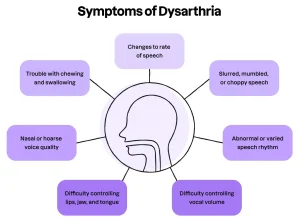Overview
Diagnosis
Diagnosing dysarthria usually begins with a detailed evaluation by a speech-language pathologist. This specialist examines the type and pattern of speech difficulty, which helps guide the neurologist in identifying the underlying cause.
During the evaluation, you may be asked to read aloud, repeat words, or form sentences while the speech-language pathologist listens closely to your speech. They assess how well you control the muscles used for speaking, including those in your face, tongue, and throat.
To further investigate possible causes, your healthcare professional may order additional tests, including:
-
Imaging tests: MRI or CT scans provide detailed images of the brain, head, and neck. These images can reveal structural problems or injuries affecting speech control.
-
Brain and nerve studies: Tests such as an electroencephalogram (EEG) measure brain activity, while an electromyogram (EMG) and nerve conduction studies evaluate how effectively nerves transmit signals to muscles. These tests can help pinpoint the source of neurological damage.
-
Blood and urine tests: These laboratory tests check for infections, inflammation, or metabolic conditions that may contribute to dysarthria.
-
Lumbar puncture: Also known as a spinal tap, this test involves collecting cerebrospinal fluid from the lower back. It helps diagnose infections, central nervous system disorders, or cancers that could affect brain function.
-
Brain biopsy: In rare cases where a tumor is suspected, a small sample of brain tissue may be removed for lab testing to determine the cause of symptoms.
-
Neuropsychological tests: These assessments measure thinking, comprehension, and communication skills. Although dysarthria affects speech muscle control rather than cognition, such tests help detect other neurological conditions that may coexist.
Treatment
Treatment for dysarthria focuses on improving speech clarity and addressing the underlying cause. The specific approach depends on the condition affecting the muscles or nerves involved in speech. A healthcare professional may treat the root medical issue first, while a speech-language pathologist works with you to enhance communication skills.
Speech and language therapy
Speech therapy is the primary treatment for dysarthria. A speech-language pathologist tailors a plan to your individual needs, which may include:
-
Practicing slower, more deliberate speech to improve clarity
-
Strengthening the muscles used for talking through specific exercises
-
Learning to control breathing for better speech volume and rhythm
-
Using simple, short phrases to improve communication
-
Developing strategies to correct or adapt to speech changes
For some individuals, therapy includes training in nonverbal communication methods such as gestures, writing, or using assistive devices.
Treating the underlying cause
If dysarthria results from a specific condition, addressing that condition may improve symptoms. For example:
-
Medications may help manage neurological conditions like Parkinson’s disease or multiple sclerosis.
-
Surgery might be needed to remove a brain tumor or relieve pressure on affected nerves.
-
Adjusting existing medicines can help if side effects are contributing to speech difficulties.
Supportive communication techniques
Dysarthria can be emotionally challenging, especially when communication becomes frustrating. Supportive strategies include:
-
Speaking slowly and clearly in quiet environments
-
Using gestures or writing to supplement speech
-
Asking listeners to repeat what they understood to confirm communication
-
Taking breaks during long conversations to prevent fatigue
Family members and caregivers may also benefit from communication training to help support those living with dysarthria.
Ongoing management
Because dysarthria may be chronic or progressive, ongoing therapy and regular follow-ups with healthcare professionals are often necessary. Consistent speech exercises and adapting daily communication techniques can help maintain confidence and quality of life.
Advertisement

